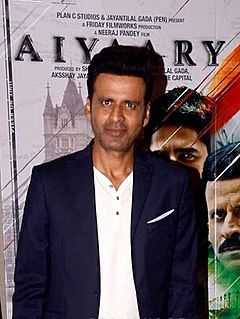A Quote by Manoj Bajpayee
When I came to industry, theatre persons were regarded as those people who will only ask questions and will be an annoying factor on the set, and there was no preference given to them.
Related Quotes
Harry constantly repeated Dumbledore's final words to himself. "I will only truly have left this school when none here are loyal to me. ... Help will always be given at Hogwarts to those who ask for it. "But what good were these words? Who exactly were they supposed to ask for help, when everyone was just as confused and scared as they were?
To me, one of the most profound questions we can ask is: "So what?" And so what if there's an indefinite number of worlds with alternate "us-es" in them? The "so what," to me, comes alive when I ask myself: "What if I could find a way to get in touch with those alternate mes who made those choices?" That is, persons who, if I saw them now, I wouldn't even recognize because their choices, once small, have multiplied to make them such different people.
When we were doing the "Angel Dust" thing we got information from the National Institute of Drug Abuse because we knew that if we went out and said something about angel dust people were going to ask questions about it and we wanted to be sure we had all the information to deal with it when those questions came up. So it's all a question of being as prepared as possible out front, so that if you are going to deal with information it'll be correct. A lot of people won't check it out but some people will.
Every man, every woman who has to take up the service of government, must ask themselves two questions: 'Do I love my people in order to serve them better? Am I humble and do I listen to everybody, to diverse opinions in order to choose the best path?' If you don't ask those questions, your governance will not be good.
Every man, every woman who has to take up the service of government, must ask themselves two questions: ‘Do I love my people in order to serve them better? Am I humble and do I listen to everybody, to diverse opinions in order to choose the best path.’ If you don’t ask those questions, your governance will not be good.
Whenever I'm giving talks, I always ask people to think of the most obscure questions because I enjoy those the most. I always get the same questions: Why does Pickwick say "plock" and will there be a movie? I like the really obscure questions because there's so much in the books. There are tons and tons of references and I like when people get the little ones and ask me about them. It's good for the audience [and also] they realize there's more there.
When we approach legal reform work, we can ask questions like: Will this provide actual relief to people facing violence or harm or will it primarily be a symbolic change? Will this divide our constituency by offering relief only to people with certain privileged statuses (such as people with lawful immigration status, people with jobs, married people, etc.)?
I think it's understandable that when questions are raised, people maybe are thinking about them and wondering about them, but I have every confidence that during the course of this campaign, people are going to know who will fight for them, who will be there when they need them, and that's the kind of person I am and that's what I will do, not only in a campaign but as president.
The great Norwegian playwright, Henrik Ibsen, wrote, "One of these days, the younger generation will come knocking at my door." The future is knocking at our door right now. Make no mistake, the next generation will ask us one of two questions. Either they will ask: "What were you thinking; why didn't you act?" Or they will ask instead: "How did you find the moral courage to rise and successfully resolve a crisis that so many said was impossible to solve?


































